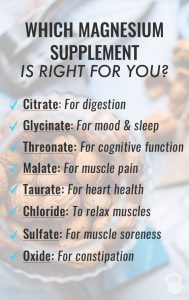Magnesium Is More Than Just A Mineral. Here’s A Short Primer!
Overall, the body contains 102 different minerals. This short primer discusses Magnesium, one of seven “Major” minerals your body needs to function efficiently. Many are trace minerals, but today we will learn a little more about Magnesium, the types of Magnesium and why it’s important for your health.
What is Magnesium?
Magnesium is described as a “light metal” and the first metal on the periodic table that is useful. If you’re curious, it’s #12, “Mg”. Refer to this short video to find out more about this aspect of the metal.
Just as there are different types of proteins, fats and carbohydrates, there are different types of Magnesium. This list describes 10 types of Magnesium. Interestingly enough, magnesium is combined with something else, like an acid or a salt, to form the final product:
- Citrate
- Oxide
- Chloride
- Lactate
- Malate
- Taurate
- L-Threonate
- Sulfate
- Glycinate
- Orotate
Each form of Magnesium has a specific function in the body. One may provide a calming effect while another may be specific to DNA or brain cells. Still a third might be useful in treating heartburn or other digestive issues. Visit Healthline for information on which form of magnesium does what function.
Types of Magnesiums to Choose From:
Citrate – Constipation
Oxide – Constipation but body doesn’t absorb well
Chloride – Constipation
Lactate – Gentle on the digestive tract
Malate – Fibromyalgia
Taurate – High Blood Pressure, High Blood Sugar
L-threonate – Brain Fog, Depression, Memory Loss
Sulfate – Epsom Salts
Glycinate – Calming, Anxiety, Depression, Insomnia
Orotate – Heart Health, Energy Production in heart and blood vessel tissue
Supplements & Food
 Many foods contain magnesium on some level. However, even with healthy eating habits, you may not be getting enough of this important mineral. Specifically, magnesium can be found in:
Many foods contain magnesium on some level. However, even with healthy eating habits, you may not be getting enough of this important mineral. Specifically, magnesium can be found in:
- Beans
- Leafy Vegetables
- Nuts
- Whole Grains
- Dark Chocolate
So, you may need a supplement to help your body gain and maintain appropriate magnesium levels. When considering a supplement, Healthline gives this warning, “Because supplements aren’t regulated in certain countries, including the United States, look for products tested by a third party, such as USP, ConsumerLab, or NSF International.” Also, consider the correct dosage. The resources below can help guide you in that respect. As always, contact your physician to find out if you are indeed in need of magnesium.
Resources:
- 10 Interesting Types of Magnesium
- Magnesium Supplements: Benefits, Deficiency, Dosage (Be sure to click on the appropriate category at the top)
- Minerals: Their Functions & Sources
- Magnesium: Periodic Table of Videos
Learn More About Holistic Wellness Through A Christian Lens In Our FitBits
